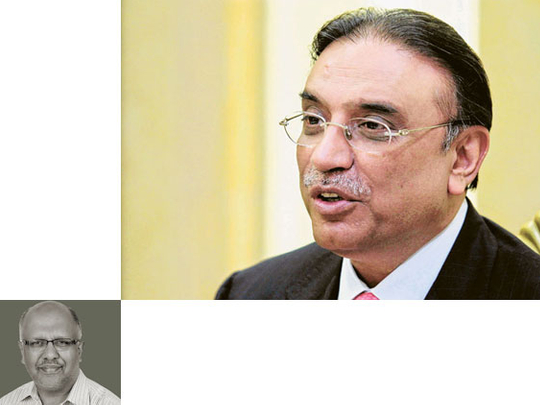
A landmark verdict by Pakistan’s Supreme Court on Friday once again lays the ground for a fresh challenge to the future of Pakistan’s ruling coalition led by President Asif Ali Zardari’s Pakistan People’s Party (PPP).
The verdict has reversed a recent act of parliament which gave key elected officials, notably the prime minister, immunity from prosecution on contempt of court charges. For an inexperienced observer of Pakistan’s affairs, the Supreme Court’s verdict may indeed undermine a democratically elected regime. Yet, nothing could be further from the truth.
The verdict is the latest twist in an ongoing saga which started with a controversy over Zardari and is becoming a debate on how best Pakistan ought to be governed.
Earlier this summer, Pakistan’s former prime minister Yousuf Raza Gilani was forced out of power on a contempt of court charge. This was the grand finale following months of refusal by Gilani’s regime to formally approach the authorities in Switzerland and request a reopening of investigations into allegations of corruption against Zardari.
Zardari is alleged to have received kickbacks from two Swiss companies with business interests in Pakistan when his late wife Benazir Bhutto was prime minister in the 1990s.
Any politician, who claims innocence and seeks to redeem his credentials, must be open to accountability. After all, individuals in high public office in any democracy must consider their public image as the ultimate defining criteria of their moral authority to rule. Yet, that is not the way Zardari or his partners in the PPP appear to have proceeded. Instead, their response has simply been to cry foul at every step of the process, in an effort to defy the odds. This approach appears to have fuelled the rigorous push for a controversial parliamentary legislation on the contempt of court affair, to protect Prime Minister Raja Pervez Ashraf from meeting Gilani’s fate.
While Pakistan’s so-called democratic government finds itself in a tight corner in its battle with the Supreme Court, there are other matters which have hurt its credentials. For instance, there could not have been a more controversial move than picking Ashraf as Gilani’s replacement at a time when Pakistanis are lamenting the worst electricity shortages in Pakistan’s history.
Tainted tenure
Dubbed by the media as ‘Raja rental’, Ashraf earlier served as the minister of water and power before being dropped from the cabinet in early 2011. He was accused of failing to deliver on his promises to end the electricity shortages. He was also embroiled in the much publicised rental power stations scandal on which the exchequer spent billions of rupees for nothing.
This background is indeed relevant in a year when Pakistanis have fought pitched battles with the police in protests against power shortages lasting up to 20 hours a day. The crisis of credibility in the government has complicated matters.
The advent of winter is likely to expose Pakistanis to gas shortages too, a recurring pattern which has built up increasingly under the present regime.
Ashraf is due to appear before the Supreme Court this week to face charges of contempt, in a repeat of the accusations which surrounded Gilani. The latest verdict on immunity theoretically could see him meeting the same fate as his predecessor.
The people’s verdict is already out. Faced with the worst public relations disaster than any other regime in Pakistan’s history, Zardari and his coterie must now reconcile themselves to an uphill battle. Irrespective of what judges think, Pakistanis appear to have already written off the government.
Farhan Bokhari is a Pakistan-based commentator who writes on political and economic matters.










